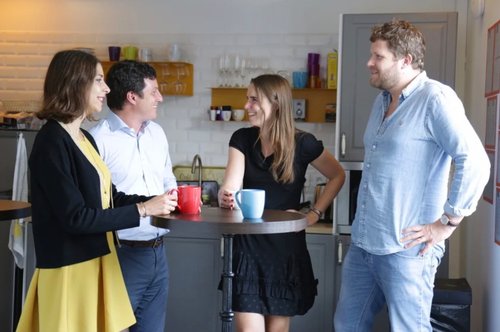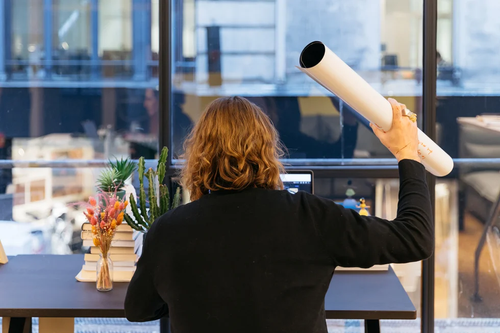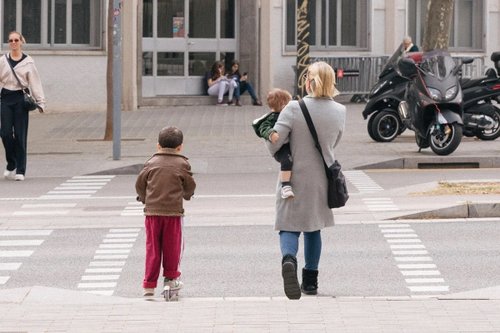Reddit: Meet the Antiwork brigade
25. 11. 2019
9 min.


Journaliste - Welcome to the Jungle
Why do you feel useless when you’re unemployed? Why do you feel like you have less value when you find out that you aren’t paid as much as a friend? When society attaches your self-worth to your work, these questions are inevitable.
For members of a community on the social network Reddit, our jobs shouldn’t define us. With 1.6 million members—and counting— this SubReddit has connected over one idea: that work and humans are incompatible. On this SubReddit which could only be called antiwork, members discuss, mock and complain about work. But together, they also imagine and advocate for a world in which the way we work is made more acceptable by sending each other articles, memes, videos, questions, critical theory pieces and even advice. If choosing a career with “meaning” is becoming increasingly important, it’s the entire concept of work that this community is re-evaluating.
We met with some of the forum’s antiwork users to better understand the motivation behind their fight. Are you ready for a small dose of cynicism?
Work - what exactly is the problem?
Work denies us our individuality
Sifting through posts on the antiwork SubReddit, one of the most common accusations launched against work is the lack of authenticity in professional relationships. For Diablo, an antiwork member, this is what spurred him on. “It’s ironic, but I’m actually working right now,” he said. “Ever since I started working, I’ve put a lot of pressure on myself to never miss work. I always considered work to be important while feeling that a lot was expected of me professionally. It really bothered me when my grandmother became ill and I had to work something out with the office to go and see her. It drove me mad not to have the freedom to go and see her. She died shortly afterwards, and in hindsight, I have a hard time understanding why I put my work before her. I could have taken a few days off to go and see her but I didn’t have the nerve to ask. Today it seems absurd to me to have not taken the time off work. That situation really got me thinking.”
“When my grandmother became ill […] it drove me mad not to have the freedom to go see her. She died shortly afterwards, and in hindsight, I have a hard time understanding why I put my work before her.”
Diablo*
Many of us have lived through what Diablo describes to some extent. Pressure, competition and high stakes at work can remove or alter our sense of priority. We spend most of our time at work without even realising it. The office world can often seem totally devoid of emotion and personal opinion, it’s a world that can sometimes cancel out our individuality. And, like Diablo, we’re ready to do whatever it takes to keep our jobs.
By changing our behaviour, holding back or keeping quiet—even though we’d like to defend ourselves or discuss a personal problem, for example—we end up not being true to ourselves and our self-confidence suffers. It’s this dehumanisation that members of this community lament, including AbolishWork, one of the SubReddit antiwork moderators. “I find that employees don’t have enough say in a company because, in the end, the bottom line will always take priority,” she said. “Incidentally, I have been disappointed by the majority of my managers but also by a lot of my colleagues. Most of my work relationships have been dictated and hindered by everyone’s individual concerns. It’s often too strategic and calculated.”
What AbolishWork is blaming here, along with other members of this SubReddit, is a certain lack of authenticity within a company. After all, as both Diablo and AbolishWork point out, “We give so much of ourselves, whereas a company could very well just get rid of us tomorrow.”
“Most of my work relationships have been dictated and hindered by everyone’s individual concerns. It’s often too strategic and calculated.”
AbolishWork
Work should not define our place in society
Dignity and work have always had a strong connection. Work is how you contribute to society. It’s your way of shaping the world and it also gives you a sense of accomplishment. When it comes to wages, that’s how you get compensated. Once again, however, the antiwork network questions this very concept. We asked SuperHeroes, another member, for his opinion. “I have a hard time with the idea that food, water and lodging, necessary resources for human survival, depend on our wages,” he said. “I don’t think wages should determine our value. This immediately implies a notion of ‘merit’, whereas I believe everyone deserves the basic necessities.”
“I don’t think wages should determine our value. This immediately implies a notion of ‘merit’, whereas I believe everyone deserves the basic necessities.”
SuperHeroes*
In fact, universal basic income is a frequently debated subject on Reddit. “In the long term, I would love to see what a universal basic income financed by local communities could be like, as more of a kind of mutual assistance than government legislation,” adds AbolishWork. Others believe that this solution could even work alongside an increased automation of labour. This would allow some of us to stop or cut back on our professional activity and spend time on occupations that add value to society.
However, not working is often perceived as degrading by society. On the forum, some members have fun with the idea of hiding their aversion to work so as not to be viewed pejoratively. We found this deeply cynical message: “I’m sure that there are others who are against work in my office, but everyone is so neutral that it’s impossible to spot them.” Does being antiwork ultimately make you an antihero?
When the mathematician Bertrand Russell declared in 1932 that “immense harm is caused by the belief that work is virtuous” he had no idea that nearly a century later, tens of thousands of people would find themselves expressing this suffering in an online forum. Even at the time, Russell was questioning the association of these two ideas. At the turn of the 20th century, he believed that manual labour was encouraged by placing value on the idea of hard labour and exertion. In a way, workers were promised that they’d get into heaven because spending long hours at work kept them from turning to alcohol or crime.
Today, even if our work has become more sedentary, this reverence of labour has certainly left its mark on society. A recent Totaljobs study revealed that 38% of British workers feel pressured into staying late while 31% of bosses said if employees leave on time, they are looked down on. Antiwork supporters find the idea of our value being defined by work as unfair, or even wrong.
“Immense harm is caused by the belief that work is virtuous.”
Bertrand Russell
Work versus free time
Why do we have to spend the majority of our time at work? This is the biggest issue that comes up on the social network. “As an employee, we sell our most precious resource to our company: time. I can’t bear the idea of expending all my energy at work, then coming home and having no energy to devote to things I care about,” Diablo said.
“We sell our most precious resource to our company: time.”
Diablo*
Just as when we used to gaze out the window at school, imagining playing with our friends all day, they imagine their days not working. This comment on Reddit sums it up perfectly: “There is nothing that I enjoy doing eight hours in a row.” Many users agreed that no activity seemed acceptable five out of seven days a week for a minimum of eight hours a day. Playing video games, engaging in a creative activity; whatever the subject, as soon as we feel forced to do something for such a long time, it becomes a burden.
“There is nothing that I enjoy doing eight hours in a row.”
Diablo resents not having time for sport while for others, it’s watching films, playing games, doing research, reading and so on. For many, this rebellion against work is about having more time for leisure activities. For Brian Dean, author of the essay, Antiwork, work and leisure are the opposite sides of a coin. One doesn’t exist without the other: leisure is earned and isn’t possible without hard work.
This lack of freedom is a source of suffering for the antiwork brigade. Unable to decide their own hours and yielding to a form of discipline at the risk of being fired, they ask: “Is this truly acceptable?” Many adopt Cartesian tabula rasa, by which they get rid of all preconceived ideas and start with a clean slate to question the concept of work. “I haven’t always been against work,” said AbolishWork. “I always thought that work was a proper pain in the neck but that there was nothing I could do about it. But I never questioned this feeling of hardship. I always said to myself that it was just an aspect of society that I didn’t understand. Nonetheless, there are many of us enduring ‘bullshit jobs’, as anthropologist David Graeber calls them.” So, then, is it possible to reclaim our time and escape from work? From here, the idea begins to grow…
“I haven’t always been against work. I always thought that work was a proper pain in the neck but that there was nothing I could do about it. But I never questioned this feeling of hardship”
AbolishWork
Is work unavoidable?
Yes, but at what cost?
It’s rare to hear someone say that they have “the choice” of working or not. Working is just the way it is for most of us. This was much to the chagrin of SuperHeroes, who decided at the age of 14 that he was going to be antiwork. On Reddit, SuperHeroes doesn’t use the expression “work” but “forced labour”. “I realised at a young age that being forced to work every day against my will wasn’t normal. I left school and took a series of jobs. They weren’t boring or difficult, but I always quit because I couldn’t stand the idea of being obliged to work. I’m against forcing humans to do anything, full stop! I’ve been this way for a long time and will be like this for the rest of my life.”
To give our work meaning, it’s generally advisable to choose a job in which we also personally thrive, which is one that helps us to develop our skills and find our identity. For SuperHeroes, it’s the entire concept of free will that must be questioned here. It’s a testament to classic philosophical discourse: “Is work an obligation?”,”Is work just an obstacle to our freedom?”
“I realised at a young age that being forced to work every day against my own will wasn’t normal […]I’ve been this way for a long time and will be like this for the rest of my life.”
SuperHeroes*
For SuperHeroes, the answer to the question, “Can we live without work?” is crystal clear: “Yes, but you have to accept the consequences.” While he’s happy to devote himself to his passions, he had to give up certain privileges. “I live with my parents. Honestly, living with my parents isn’t fun, but it’s mostly worth it because it leaves me to do what I want with my time. It’s also worth remembering that even nowadays, in many countries families still live together, even after the children grow up.”
Not working means SuperHeroes has also lost his independence. Whether you’re relying on parents, a spouse or on social assistance, stopping work inevitably forces you to depend on others.
“…living with my parents isn’t fun, but it’s mostly worth it because it leaves me to do what I want with my time.”
SuperHeroes*
Leaving the world of work also has social consequences. When we think about the time we spend discussing work with our friends, it makes sense that leaving this system means it’s hard to keep or even make these social ties. “When you don’t earn any money, you can’t really participate in social activities. I can’t really go out any more, like go to have a drink at a bar, and then I don’t have a car so I can’t get around. I can’t give gifts for birthdays or at Christmas. In fact, I don’t have anything to offer so I quickly lost touch with my friends. It’s my fault, but I don’t want to be a burden to others.” SuperHeroes doesn’t seem to regret his choice, but other antiworkers have found solutions to make work more tolerable.
Can softening company policies improve the situation?
Luckily, a few simple steps have already started to help Diablo make peace with working. “I’ve been working for a company for a little while now which gives me quite a bit of freedom,” he said. “I work primarily with deadlines, so the only thing that matters is handing my work in on time. I can get up a little later or go to bed a little later if I feel like it. I can shop during the day, work out or play a game when I want. I even have the option of working remotely. All these factors have greatly improved my situation.”
It’s the same deal for AbolishWork. “Personally, I’m all for a big revolution in the world of work, but a few gradual changes before that are welcome,” she said. “Employees should have more say at their workplace; they should have more flexibility with their working hours and we could even implement a shorter working week.”
“I’ve been working for a company for a little while now which gives me quite a bit of freedom. I work primarily with deadlines, so the only thing that matters is turning my work in on time.”
Diablo*
A four-day week, working remotely, flexible hours: the working world seems to have taken heed of their anger as it slowly evolves and adapts to new expectations. But it’s not just the way you work that can change. Your entire way of living can also be questioned. For example, you can try living in a cooperative or in a more drastic measure, living off the grid.
Hopefully the antiwork brigade will find these new measures convincing. But at least for now, the antiwork forum allows its members to dream of another way of working and of reshaping society.
“There are more than 50,000 of us discussing this on the SubReddit and it’s one of my biggest political accomplishments. Along with the other moderators, we’re happy to be creating a dialogue and getting people thinking about this topic, even if it sometimes reinforces negativity,” said AbolishWork. And if you aren’t a huge fan of work either, you can share your thoughts with the community here!
*- Names changed for anonymity
Translated by Kalin Linsberg
Photo: WTTJ
Follow Welcome to the Jungle on Facebook and subscribe to our newsletter to receive our best articles.

Viac inšpirácie: Modern Work

Are you guilty of generational stereotyping?
Often called the last acceptable prejudice, ageism is a growing concern in our increasingly multi-generational workplaces
07. 3. 2023

So, are robots really coming for our jobs? A conversation with futurist Gary Bolles
Fears of an AI apocalypse loom large, but what are experts saying about the future?
07. 3. 2023

US unions are gaining momentum, but outdated labor laws are in their way
As American unions are having a moment, outdated regulation is throwing a wrench into workers' efforts
17. 10. 2022

The dark side of the influencer economy
The life of content creators may look glamorous from afar, but behind the scenes hides a world fraught with prejudice and discrimination.
28. 7. 2022

Parents hitting the wall: The most overlooked form of burnout
Research suggests a large portion of America's working parents are burning out. So why aren't we talking about it?
24. 6. 2022
Novinky, ktoré to vyriešia
Chcete držať krok s najnovšími článkami? Dvakrát týždenne môžete do svojej poštovej schránky dostávať zaujímavé príbehy, ponuky na práce a ďalšie tipy.

Hľadáte svoju ďalšiu pracovnú príležitosť?
Viac ako 200 000 kandidátov našlo prácu s Welcome to the Jungle
Preskúmať pracovné miesta